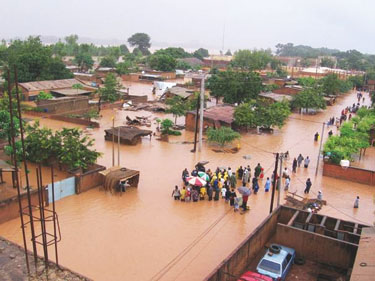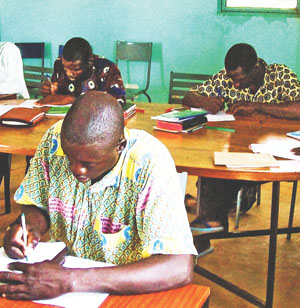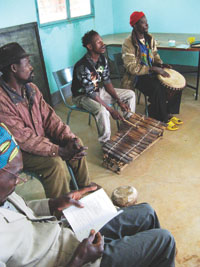Canadian Mennonite
Volume 13, No. 19
Oct. 5, 2009
Burkina Faso Feature
Devastating floods follow fires in West African country
 |
On Sept. 1, a flood disaster of epic proportions devastated the capital region of Ouagadougou, Burkina Faso. The devastation followed a destructive fire that swept through three rural villages on May 2, villages that are home to members of a fledgling Mennonite church.
In a Sept. 2 letter of request for prayer, Siaka Traoré, president of the Burkina Faso Mennonite Church, said official reports recorded five deaths. The government is preparing an appeal for international assistance, he said, and more rain was in the forecast.
Mennonite Church Canada Witness workers Anne Garber Kompaore and Jeff Warkentin both reported to MC Canada offices about the unusually heavy rains that turned streets into canals.
Ouagadougou residents are accustomed to brief flash floods and mud during the rainy season, but were unprepared for a storm that dumped nearly 300 millimetres of rain—about half the normal rainfall for the entire rainy season—on the city and surrounding region in a matter of hours. Those with cement-block houses fared reasonably well, but mud brick is the only affordable option for many, meaning the heavy rain essentially dissolved entire neighbourhoods, reported Kompaore in an e-mail. “Cars parked along the canal were tossed around like Matchbox toys and piled in disordered array,” she wrote.
Kompaore herself said that the force of the water punched holes in an outer cement block wall surrounding her family compound, and numerous outbuildings on her property were temporarily flooded.
Warkentin said that, oddly, his neighbourhood sustained no damage.
Kompaore’s husband Daniel runs a school for children unable to attend public school. Many families sought temporary refuge in the school, adding to the nearly 200 official refuge centres established throughout the city.
City and national authorities are overwhelmed trying to take care of their own damage and help the homeless at the same time. An estimated 150,000 people are homeless, wrote Traoré, about a 10th of Ouagadougou’s population. The entire population has been called upon to donate clothing, bedding, food and money. About $400,000 Cdn was raised locally in the space of 24 hours, Kompaore wrote.
“There is no way one can rebuild a mud house in the middle of the rainy season,” which normally lasts from June to October, she added.
The city’s developing drainage infrastructure was not able to handle the sustained downpour. Twelve bridges were damaged and five collapsed, wrote Traoré. Two hospitals had to be evacuated from the rooftops. Hospital staff worked to remove nearly a metre of water and mud from new surgical suites, he added. Expensive diagnostic imaging equipment was also damaged.
“The underground garage of the West African Monetary Union became an underground lake, and irreplaceable archives and documents of numerous other buildings, as well as millions of dollars of computer and medical equipment, were lost,” Kompaore wrote. In addition to shelter, disease and clean drinking water top the priority list of government concerns.
The Office for Development Projects (ODE), the relief and development arm of the Federation of Evangelical Churches and Missions in Burkina Faso and a long-time Mennonite Central Committee (MCC) partner, has asked MCC for financial assistance. The Evangelical Mennonite Church of Burkina Faso is a participating church in ODE.
MCC has pledged $20,000 and is accepting additional donations. ODE will use MCC’s contribution to supply food, mosquito netting, mats and soap, and to rebuild homes. Other aid organizations, including the United Nations and the Red Cross, are responding to the immediate need, providing food and clean drinking water.
Mennonites training their own church leaders in Burkina Faso
ORODARA, Burkina Faso
 |
During a lull in his Bible studies, Hamidou Traoré looks out through the window of the radio recording studio at the cement bricks outlining the future home of the Mennonite church’s Bible school.
Traoré is one of seven young leaders preparing for ministry at Eglise Evangélique Mennonite du Burkina Faso. They took up their studies in January, the beginning of the dry season, when the agricultural work that feeds their families is not as demanding.
The vision of preparing Mennonite church leaders for ministry dates back more than a decade.
“For several years, we have given this task to sister denominations, who have trained our people in their Bible schools,” says Siaka Traoré, national president of the Evangelical Mennonite Church of Burkina Faso and one of the teacher-mentors at the Basic Biblical Training Center in Benin. “The time has come to begin a training program that will take into account our doctrinal convictions as Mennonites.”
Hamidou Traoré—not closely related to Siaka Traoré; their shared family name is one of the most common in Burkina Faso—and the six other leaders-in-training are being shaped for leadership in a way that draws on centuries-old educational methods. Four experienced pastors give of their time to teach and mentor the students in the Dioula language, which is the most widely used language in the region where the Mennonite church is strongest.
“In traditional societies, before the arrival of formal education, fathers faithfully transmitted their wisdom to their sons and mothers did the same for their daughters,” says Siaka. He also points out that the Apostle Paul spoke of elders transferring their knowledge to younger people in the church and that Jesus taught by mentoring. “The evangelical principle of making disciples is what motivates us in undertaking this program,” Siaka says, adding, “With the goal of building a strong and growing church, we have found it imperative to give training to those whom God is calling to service.”
Traditional education methods do not require extensive infrastructure, permitting training to begin even before construction of the Bible school is completed. Three students began biblical studies in January 2008, in rooms belonging to the Mennonite radio recording studio that was built in 2006 through the joint efforts of Mennonite youths from Burkina Faso and France working side by side.
About 13 percent of the funding for training is contributed by the students, their sending congregations and the national church. The rest of it comes from the Burkina Faso Partnership Council, the administrative structure through which North American Mennonite mission agencies, including Mennonite Church Canada Witness, work in the country.
Hamidou Traoré’s father, Tiéba, was the first person to become a Christian as a result of Mennonite witness in Burkina Faso in the early 1980s. It was during those years that two Africa Inter-Mennonite Mission linguists, Anne Garber (now Anne Garber Kompaore) and Gail Wiebe, first began to work in his village of Kotoura.
Tiéba’s determination in turning from African traditional religion and Islam to follow Jesus encouraged his son to do the same. “I love God’s Word and deepening my understanding of it,” says Hamidou, who leads worship and is a member of the leadership committee of Kotoura Mennonite Church.
Personal Reflection
Tuning in to Christ
ORODARA, Burkina Faso
 |
With only two days and slim re-sources to work with, Bible translator Souleymane (Solo) Traoré called us together to compose and record Christian songs in the Siamou language. I was sceptical about what we could accomplish in such a short period of time, considering our limitations.
Our group gathered at 11 a.m. in an Orodara recording studio, two hours after the workshop was scheduled to begin. Among us were three griots (traditional musicians); Ruth, a Siamou pastor’s wife; a Catholic elder; two Mennonites (one of whom was a shoe repairman and the other a Bible translator); and me, completely unmusical and non-Siamou. The only unifying factor I could detect in the group was a common language and some interest in music.
But how could we draw a Christian theme for the songs we were invited to create? Siamou biblical translations are limited to creation stories and Adam and Eve. Solo and I were the only ones literate in Siamou and the griots were not Christian.
Solo wasn’t deterred. “When the music is in your mother tongue and in your mother music, people can sing with greater joy and understanding,” he said. “It makes you do more than just sing. It makes you dance.”
Using a selected Bible passage, Mary Hendershott, a visiting ethnomusicologist who led the workshop, guided us through techniques for developing a good refrain. Solo followed with a reading of the creation story and we discussed the aspects of it that spoke to us most profoundly. One of the griots began to pick out a tune on the balaphon (wooden xylophone) and sing his interpretation of the story.
Soon Ruth’s voice hesitantly rose in a refrain she had composed, and the others obediently but tentatively sang along. Then someone mentioned that the tune was in the Jula scale, a musical key from the trade language of the area. The griots transposed it into a Siamou scale and, suddenly, the room erupted with joy. Everyone sprang to their feet, praising God with music and song in their mother tongue, dancing to the balaphon and drums.
We managed to compose and record four rough drafts in this workshop—and plant many different kinds of seeds. The Christians present listened to the stories of creation and Adam and Eve in Siamou for the first time. The griots heard these Bible stories for the first time ever. We pray that these seeds will take root and grow.